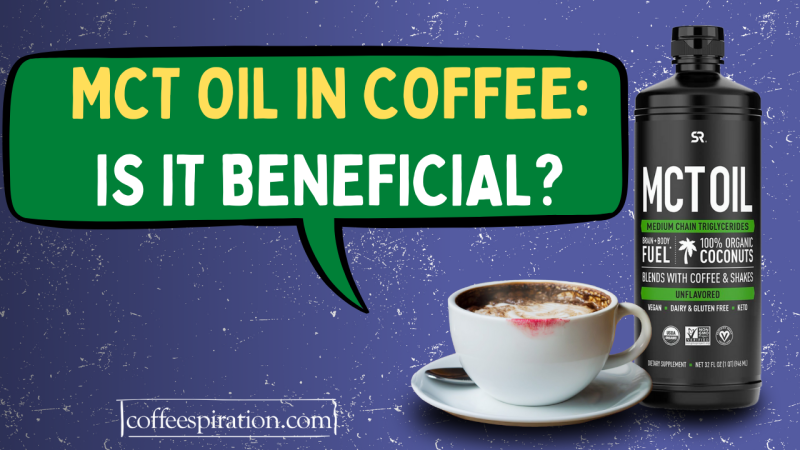Everyday, we drink coffee in one to two cups to get ready for the work that needs to be accomplished. But some people find their unique ways to consume it and simultaneously take health into consideration, for example, adding salt or probably oil. What has to do with oil? What type of oil can be put in the cup they drink? Isn’t oil unhealthy too?
It may sound greasy to you already by seeing just the word oil. Not being offensive, to be honest, it’s the preference and coffee tolerance of every individual who wishes to get any drink type they need. Many coffee drinkers can have only coffee like americano while some will want to add syrup or sugar, milk and cream.
For those who choose to put oil, specifically MCT oil, we will get into specific details later to enlighten you about such an interesting coffee recipe that they use.
Contents
1. What is MCT Oil?
1.1 Medium-chain triglyceride (MCT)
Let’s first and foremost see insight into the term MCT. It’s derived from medium-chain triglycerides or in abbreviation called MCTs, which are fats that exist in foods such as coconut oil and butter. The fats existing in MCTs provide many health benefits.
There are three fatty acid groups and a single glycerol molecule linking to triglycerides, which their purposes are found in human body fat or as a source of energy between meals. Triglycerides have a chemical structure where the fatty acid groups have different lengths along with a certain amount of carbon atoms. So, these fatty acids are categorized into long-chain triglycerides, medium-chain triglycerides, and short-chain triglycerides.
- Long-chain triglycerides (LCTs) or fatty acids contain from 13 to 21 carbon atoms
- Medium-chain triglycerides (MCTs) or fatty acids contain from 6 to 12 carbon atoms
- Short-chain triglycerides (SCTs) or fatty acids contain less than 6 carbon atoms
The abovementioned fatty acids have distinct functions in the body that either make you healthier or offer no benefit if you consume excessively. Starting with LCTs, those contained in food include extra virgin olive oil, soybean oil, seafood, almonds, avocado, and beef. Omega-3 LCT or fatty acid is good for helping heart health. LCTs, on the other hand, lack the same quick energy levels as MCTs.
Talking about SCTs, those can be generated when bacteria in your stomach digest fiber, hence helping with digestion and giving cellular energy in the colon.
Back to MCTs, indeed the advantageous ones, especially when you’re practicing a ketogenic diet, since the body digests and takes MCT in quickly. If you consume MCTs, the fats will be transported directly through the gut to the liver and bloodstream, then your body will use them as an immediate source of energy or ketones. Ketone production starts when huge quantities of fat are broken down by the liver.
1.2 Types of Medium Fatty Acids or MCTs
However, MCTs also have four different types of which only one of them is beneficial. Let’s look at the four primary medium fatty acids.
- Caproic acid or hexanoic acid called C6 contains 6 carbon atoms. According to anecdotal research, C6 can cause gastrointestinal discomfort although it can be changed into ketones.
- Capric acid or decanoic acid has 10 carbons and is called C10. It can help with the immune system and simultaneously give antibacterial advantages. C10 was found to be effective in killing Candida bacteria, a yeast that causes digestive stomach problems.
- Lauric acid or dodecanoic acid contains 12 carbons and is called C12 which is able to offer antimicrobial properties.
- Caprylic acid or octanoic acid is known as C8 has 8 carbons, which is the highest-quality MCT and the quickest one to be changed to ketones.
1.3 MCT oil
So how to get MCT into the body? Actually, you’ll be able to increase your intake of such medium fatty acids by consuming some food sources including coconut oil (55%), palm kernel oil (54%), whole milk (9%), butter (8%), or supplements such as MCT oils. It’s time to figure out our questionnaire.
Medium-chain triglyceride oil or MCT oil refers to fatty acids in the medium level among the three acid groups and is made from the extraction and isolation of tree oil such as coconut or palm kernel. Generally, MCT oils comprise both C8 and C10 or either only each of these MCT types. MCT oil has the advantage of having nearly no taste or smell and might be blended into foods and beverages.
2. Why not Just Coconut Oil?
MCT found in those food sources is probably sufficient enough for your daily consumption but is it beneficial to add MCT oil to your dish? It’s unclear how much of a dose is required to reap possible advantages. MCT doses vary from 0.17 to 2.5 oz (5–70 grams) per day. But for those who need higher doses, MCT oil is a better option than palm oil and olive oil.
3. What are the benefits of MCT Oil?
Simply adding MCT oil is one the best ways to give your body the healthy fats it deserves.
3.1 It has capabilities to increase weight loss
MCT oil may help you to lose weight because it increases satiation and enlarges resting energy expenditure. When you absorb MCT oil, it has a great contribution to increasing the capacity to burn body fat as well calories. Yet, once the body has adapted, these effects may fade away after two to three weeks, according to a study. Besides, MCT oil is fast digested because your body uses this supercharged oil as an energy first and then stores it as body fat.
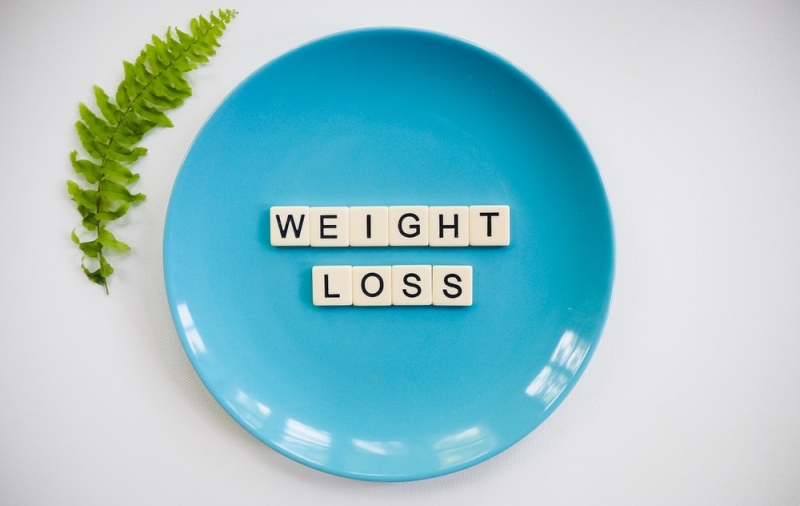
We’ve got evidence to show. There was research conducted on 49 obese males and females between the ages of 19 and 50. During a 16-week weight loss program, they consumed 18 to 24 grams of medium-chain triglyceride oil or green oil each day. When comparing MCT oil to other oil, the study found that MCT oil caused a larger reduction in body fat’s weight and trunk fat’s weight. This implies that using MCT in a diet plan might help you lose weight faster.
Increased resting energy expenditure is one of the motives MCT may help you reduce your weight. A review of MCT tests examined a variety of research comparing MCT intake to LCT consumption. They analyzed both lean and fat males in one research. The participants ate a meal that was 15 percent protein, 55 percent carbs, and 30 percent fat. The outcome was a 48 percent increase in energy expenditure in lean people and a 65 percent increase in energy expenditure in obese people.
Another study is about consuming MCT along with meals. 18 participants were gathered and given different concentrations of an MCT or LCT dose, ranging from 0 to 30 grams of MCTs. Over a 24-hour period, energy expenditure increased by 5%. This indicates that all other things being equal, their bodies burnt 5% more calories.
When it comes to weight loss, the findings of this research show that not all fat sources are created equal. When compared to other fats, MCTs have improved lipid profiles and increased energy expenditure.
3.2 Reduce cardiovascular risk
Despite the weight loss, the risk of cardiovascular disease may be reduced if you incorporate MCT oil into your coffee. Research was conducted on 24 obese males who consumed 40 percent of their calories from MCT oil or olive oil equivalents that fats stored. As a result, 19 bad cholesterol known as LDL was reduced by about 14% in those who consumed MCT oil, but olive oil had no statistically significant effect. We may safely assume that MCT is a small factor in helping minimize the danger of cardiovascular illness as a result of good cholesterol levels.
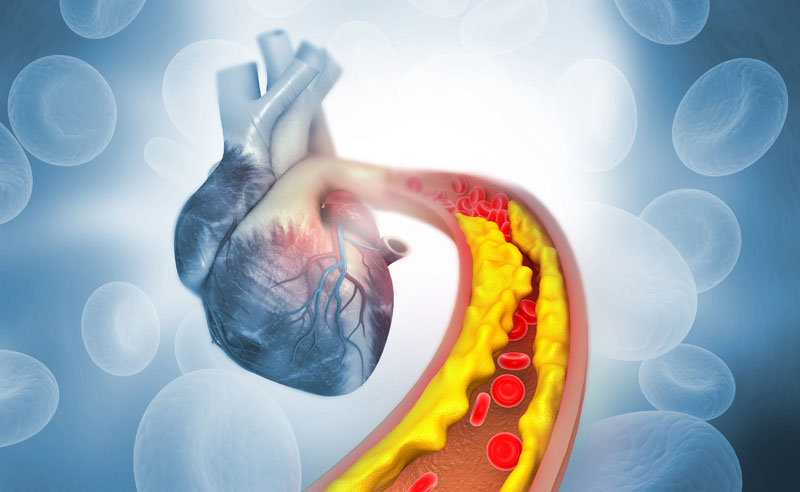
But in another situation, MCT supplements would cause a detrimental effect on cholesterol levels, raising total and LDL (bad) cholesterol, in which two of them are dangerous factors for heart disease, according to a study on 14 healthy men. Cardiovascular illness is caused by many variables; thus, establishing MCT to be a preventative strategy is unrealistic. However, in the case of cardiovascular illness, any advantage might assist to lower the likelihood of a possibly disastrous diagnosis.
Such a condition is linked to some studies that found that coconut oil is considered saturated fat. Even though studies demonstrate that consuming more saturated fat does not raise the danger of heart illness, it has been linked to various heart disease risk factors, including higher levels of LDL and apolipoprotein B.
MCT consumption has been shown to help diabetics. Over the course of 90 days, a group of type 2 diabetics was given either MCT oil or LCTs in the form of corn oil. During this time, no further nutritional changes were performed. In comparison to the LCT group, the MCT group had lower body weight and waist measurements also improved insulin control. 20 MCT appears to be a low-cost strategy for diabetics to lose weight and better regulate their insulin levels, according to the study.
3.3 Improve Cognitive Abilities
A lot of individuals drink coffee on a regular basis for mental clarity. Is it possible for MCT to amplify cognitive function?
Research involving persons with type 1 diabetes (T1D) might help us find an answer. Before undertaking a series of cognitive tests, each group was given either an MCT drink or a placebo beverage over the course of two sessions. MCT consumption reduced performance losses in tests with respect to short-term memory, a memory of speaking, and span of attention.

The findings suggest that MCT has the potential to increase cognitive performance while having no effect on adrenergic hormones or clinical reactions. This improvement in your body might be related to MCT’s ease of conversion to ketones, which is highly efficient brain fuel.
In recent times, MCTs have gained popularity as a treatment or prevention for brain illnesses such as Alzheimer’s disease and dementia.
MCTs enhanced learning, brain, and memory function in adults with mild to severe Alzheimer’s disease, according to one large research. This impact, however, was only seen in persons who did not carry the APOE4 (Apolipoprotein E) gene variation.
On the whole, the data is based on small sample numbers and short trials, therefore further study is needed.
4. How To Put MCT Oil in Coffee?
It’s practice time. You will get to know three ways of adding MCT oil to your daily coffee habits.
4.1 Butter Coffee
Remember the names “bulletproof coffee”, “butter coffee” or “keto coffee”, they are all the same. But bulletproof coffee is the name of the recipe. Organic grass-fed butter, hot coffee and an MCT-based product are the three key components in most butter coffee recipes. You can check out how to make coffee cocktails, and banana milk coffee if you need a special coffee recipe to follow!
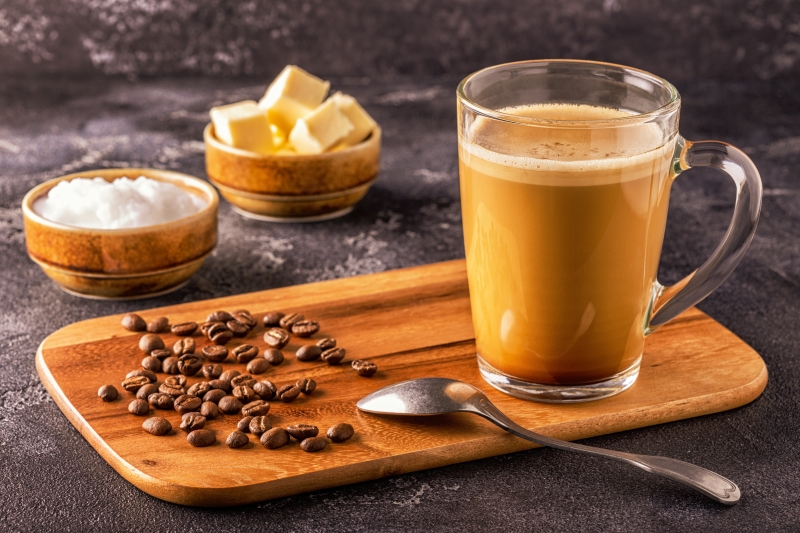
Since MCT oil appears in the coffee here, it works in tandem with the high-content-fat butter in order to increase hunger appetite and assist you to meet your daily macronutrient targets for consumption of fat.
Coffee and MCT oil combine synergistically with organic grass-fed butter to produce a potent beverage that will help you get your day started.
4.2 Keto Coffee
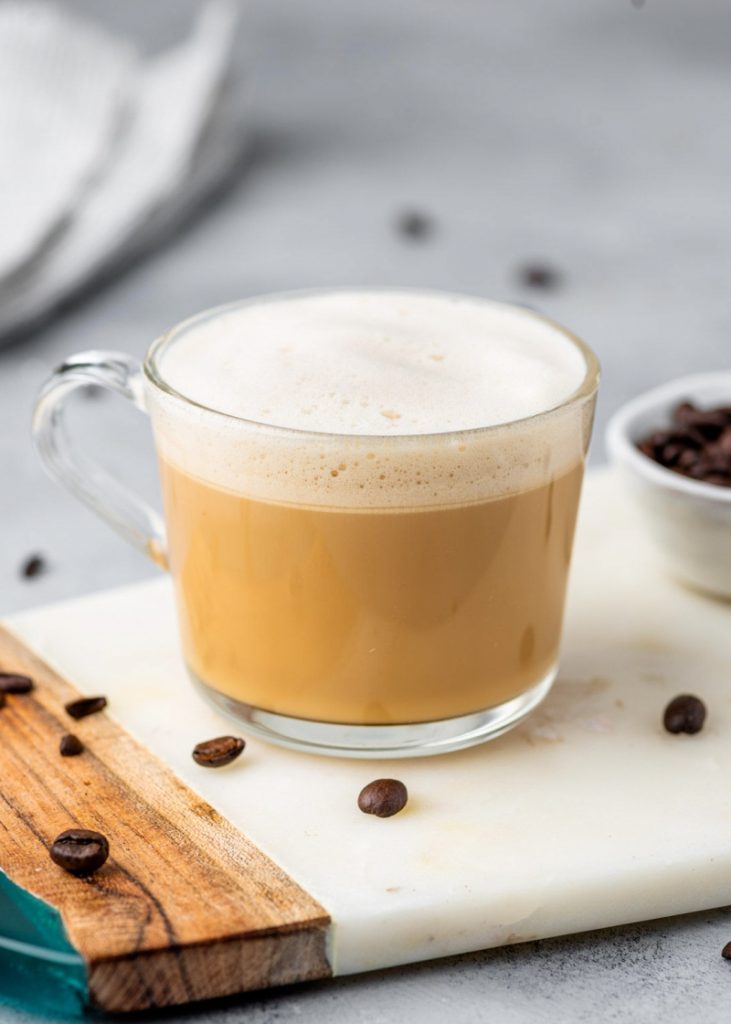
There are many keto coffee recipes but the following is simple to use and requires a few steps.
- You need to brew 8oz of hot coffee. It’s better to use fresh coffee beans like AmazonFresh Dark Roast, which taste really good and make you energetic in the morning.
- Combine brewed coffee, half a cup of non-artificial sweeteners like almond milk (regular or vanilla), one scoop of MCT oil powder (SlimFast Keto is recommended), and one tablespoon of organic grass-fed butter into a blender
Note: If you don’t want to blend, you can just put them in a cup and stir when the coffee is still hot.
- In a blender, puree them within 10-second or till desired consistency, pour into the mug you prepared and take a sip
4.3 Butter Coffee in Creamy Cocoa Form
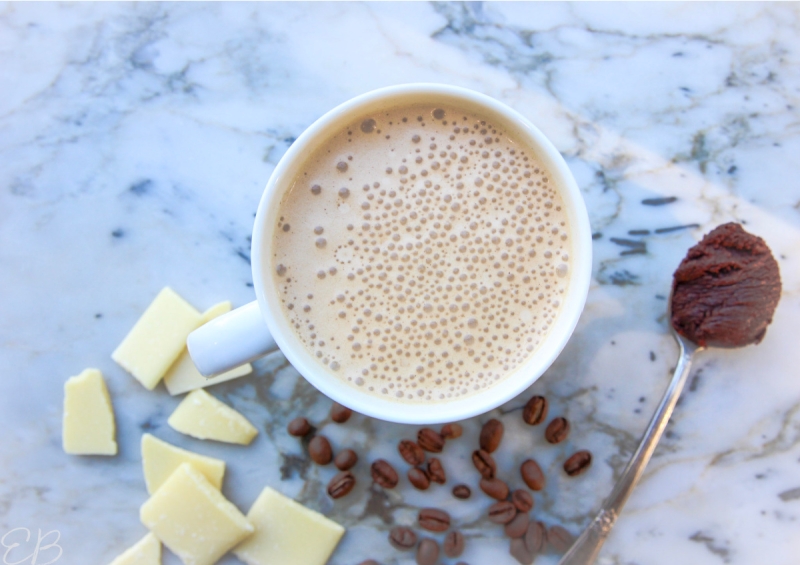
- Brew 8 oz of hot coffee in your coffee maker by using your favorite coffee beans. (Cuisinart and CHULUX are suitable coffee machines you can get)
- Combine brewed coffee, one scoop choco medium-chain triglyceride oil powder, one tablespoon organic unsalted butter, half cup chocolate protein powder, and one tablespoon heavy cream into a blender
Note: If you don’t want to blend, you can just put them in a still-hot cup of caffeinated drink and stir it well.
- In a blender, puree them within 15-second or till foamy then pour into the mug you prepared and take a sip
5. What could be the non-health benefits of MCT Oil in Coffee?
We’ll forgo the clichés about getting too many health benefits and just say that consuming too much bulletproof coffee can be harmful to your health.
Butter, as you well know, adds a lot of fat to keto coffee. MCT oil is the same way. In reality, a cup of butter coffee has at least 20 grams of saturated fat, and as much as 50 grams if you make it with two tablespoons of butter and two tablespoons of MCT oil, as in the Bulletproof coffee recipe. To put it in context, the USDA Dietary Guidelines indicate that most individuals consume no more than 22 grams of fat each day.
Calories are also worrying. When you try the bulletproof coffee recipe, you may create 500 calories while black coffee contains zero calories. That’s around a fifth to a quarter of the daily calorie intake suggested by the government.
If keto dieters only drank one cup of keto coffee in the morning and were careful the rest of the day, those figures wouldn’t be so bad. Many others, on the other hand, become acclimated to the flavor and replace butter coffee for the three, four, or more cups of ordinary coffee they drink each day. Even though keto coffee advocates a lot of fat consumption, that much fat and calories aren’t good. It will also damage your keto diet weight loss efforts.
There’s a second issue that has to be addressed. Because when many people drink bulletproof coffee and it is so filling, they are tempted to swap it for a conventional morning cup of coffee and probably skip breakfast as a result. The keto diet, on the other hand, is centered on carbohydrates, fat, and proper nutrition, and the nutrients included in a nutritious breakfast are critical for excellent health and weight loss. Keto coffee should not be considered breakfast on its own.
Finally, there’s some evidence (though it’s not convincing) that the high quantities of saturated fat in keto coffee might lead to higher cholesterol levels.
That helps to explain why having black coffee with MCT oil rather than butter coffee is a better option.
6. For Non-Coffee Drinkers, How to put MCT Oil in the drink?
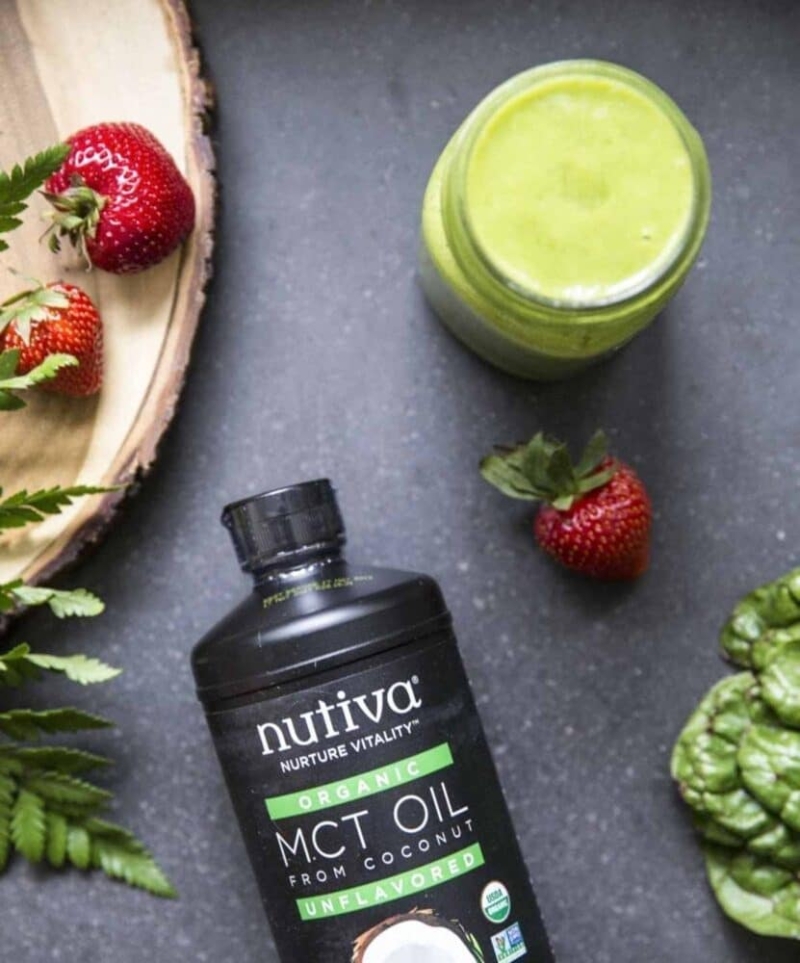
Adding MCT oil in a smoothie and salad recipe is a decent idea for those who can’t consume coffee but want to include it in their every diet. The steps to do it are similar to making keto coffee.
- Put ingredients including half a cup of blueberries, half a cup of strawberries, and one cup of spinach (Note that these fruits and vegetables should be frozen.)
- One scoop of MCT oil powder, one small beet, and half a tablespoon pure vanilla extract need to be put into a blender as well
- Longer than making keto coffee, you need one minute to blend this drink, or till desired consistency is achieved
- Pour into your glass and take a sip
Bottom Line
Coffee’s energy boost along with medium-chain triglycerides oil can help increase satiety, enhance ketone production, and offer a lift to your morning coffee ritual. It’s true that there are many health advantages that are connected to the way the body processes MCT oil.
While they won’t help you lose a lot of weight, they could help you lose a little. The same may be stated of their contribution to endurance training.
For these reasons, incorporating MCT oil into your diet might be beneficial such as following keto coffee recipes.
However, keep in mind that foods like coconut oil and grass-fed butter give extra advantages not found in supplements.
If you’re thinking about taking MCT oil, consult with your doctor first. They can assist you in determining whether or not they are appropriate for you.
References
- MCT Oil in Coffee: Here’s How to Do It | HVMN | Ryan Rodal
- MCT Oil In Coffee: What’s The Point? | Super Coffee | Ben Knox
- MCT Oil 101: A Review of Medium-Chain Triglycerides | Healthline | Mary Jane Brown
Check this video on Bulletproof Coffee : MCT vs Coconut Oil. By Health Link
